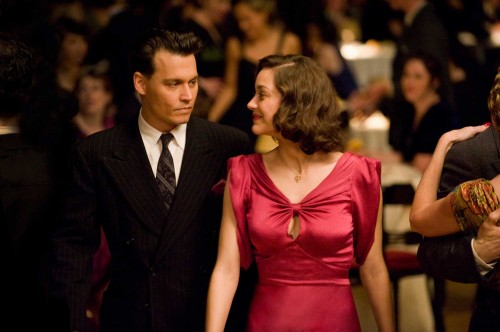Public Enemies
The Great Bank Robbery

Starring: Johnny Depp, Christian Bale
By Tom Bevis
A few weeks ago, while waiting for some hazy matinee to begin, I started thinking about how we haven’t had a good mobster flick in a long time. Then, like a godsend, the trailers clicked on and lo-and-behold: Public Enemy. The trailer gives us a promise of a fast-paced, suspense-ridden film. The best part of it all, though, is that it’s based on one of the most interesting and daring characters in the history of American crime, John Dillinger.
The sad truth is the trailer wrote a check we couldn’t cash in.
The film is an immensely basic rehashing of the career and death of Depression-era bank robber John Dillinger and his gang. We watch as Dillinger does what he does best: robs banks and plans prison breaks while trying to juggle needs that are more civilian, such as friendships with his gang, relationships with his fellow public enemies, and a budding and stressed (as well as largely fictitious) romance. But the film, overall, feels more like an encyclopedia entry than an artistic and dramatic presentation. The events are portrayed hastily, bland and flat-paced to the end.
Quite the opposite of director Michael Mann’s earlier effort at the crime genre, Heat (which is said to be too long and bloated by extensive character portraits and event breakdowns), Public Enemy seems rushed from scene to scene. Watching the film feels like moving from breadcrumb to breadcrumb in a dark forest of fancy sets and sub-standard costuming. The scene are presented as pale caricatures instead of the lush portraits they should be and they don’t tend to work with one another. The events of one scene, for example, rarely effect the weight or pace of the next.
To make things worse, the director ad scriptwriters throw in awkward, over-looked, and mostly unfinished subplots such as the struggling status of the newly-founded FBI, the lives and deaths of bank robbers Pretty Boy Floyd and Baby-Face Nelson, and the stressful career of Dillinger’s prime nemesis, Melvin Purvis. These subplots are introduced, hinted on, and then dropped just as quickly. Some of them are brought back up later, but none of them are ever resolved.
The main plot share much of this dilemma. By the end of the film, we have a slight idea of who John Dillinger was, but we have little excuse to care. The movie simply rolls by too fast, the scenes end too quickly, for the audience to develop any attachment to the characters, one way or the other. Even the romance arc, which is presumed to justify both Dillinger and his lover, was initiated in one scene and summarized in another.
The film doesn’tt have any of the nostalgia or power that other period pieces have. The vocabulary and clothing could have been taking from the street if it weren’t for the strained efforts of the acting performing the roles. Bale performs his role well and Depp, shockingly, doesn’t draw from prior successful roles as has become his trademark. The rest of the cast, however, seem to sit back and read their lines.
2/5
